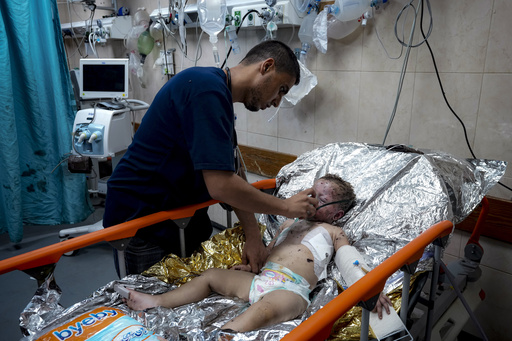DEIR AL-BALAH, Gaza Strip (AP) — The 2-year-old toddler lay on a foil blanket, her face covered with salve for her burns and her little body riddled with scars from shrapnel. She squirmed, her breath heaving, as doctors examined her and the tube in her chest.
Siwar Abdel-Hadi is now an orphan. She’s the lone survivor of an Israeli strike that hit their family home in central Gaza, killing her parents, her two sisters and her brother, along with a brother of her mother.
“The whole family was gathered around a table for lunch” when the missile struck Tuesday in the Bureij refugee camp, said Nour Abdel-Hadi, one of Siwar’s paternal aunts. She spoke at nearby Al-Aqsa Martyrs Hospital in Deir al-Balah, where the overwhelmed staff rushed around her dealing with influxes of wounded.
Israel’s campaign of bombardment and offensives in Gaza has left thousands of orphans. Cases like Siwar’s have become so common, doctors created an acronym for it: WCNSF, “wounded child, no surviving family.” The United Nations estimated in February that some 17,000 children in the territory are now unaccompanied, and the number is likely to have grown since.
The Israeli military rarely comments on individual strikes. It says it targets Hamas fighters and infrastructure and blames the militants for civilian deaths because they work in residential areas and among the population. On the day of the strike that killed Siwar’s family, the military said it hit dozens of targets across the Gaza Strip, including military structures, observation posts and individual militants.
Israel says it is determined to destroy Hamas after the militants’ Oct. 7 attack on southern Israel. Its campaign has killed more than 39,100 people, according to the Gaza Health Ministry. Of those, women and children make up around half the dead whom the ministry has firmly identified, and an unknown proportion of the nearly 10,000 it has yet to identify. Doctors often say children make up a large proportion of the wounded that come streaming into hospitals.
At the Kamal Adwan Hospital in northern Gaza, another orphaned child was recovering from her wounds.
Three-month-old Asma Ajour’s family was fleeing their neighborhood in Gaza City after the Israeli military issued evacuation orders and moved in against Hamas militants it said were operating there.
As the family fled July 8, Israeli shelling hit the street, killing Asma’s mother and father and two sisters, 3 and 5 years old, said Asma’s grandmother, Basema Qwedar. Asma lay in the street in her dead mother’s arms for 12 hours, until her grandfather — who was searching for them — heard her cries and found her, Qwedar said, rocking the infant in a child’s seat at the hospital.
Two of Qwedar’s sons were killed by strikes earlier in the war, and now she has lost her daughter, Asma’s mother. They don’t know yet who will take in Asma, but Qwedar said her daughter had told her, “If something happens to me, take care of my child.”
At Al-Aqsa Martyrs Hospital, Siwar’s extended family was similarly trying to figure out how to take her in. Her grandparents are still alive, but are sick and may not be able to raise her, Nour Abdel-Hadi said. Otherwise, one of her aunts will take her, but they are struggling with their own children during the shortages of food and supplies in the war.
The Abdel-Hadis were a close-knit, loving family, relatives said. The parents, Hisham Abdel-Hadi and Hedaia Yasin, made sure their kids got high grades. As the youngest, Siwar was showered in toys, they said. They had fled their home three times during the war to escape frequent bombardment in central Gaza, but each time returned, most recently in May.
Israel “didn’t leave anything for Siwar, no father, mother or siblings. Even her toys and bed are gone,” Nour Abdel-Hadi said, sobbing.
Doctors said they were treating Siwar for second-degree burns on her face, shrapnel wounds and collapsed lungs.
“God give us the capability to raise her,” said another aunt, Amal Abdel-Hadi. “May she live a dignified life, to play among children. May she not keep enduring what she’s already experienced, all the bombing and missiles and deprivation.”


